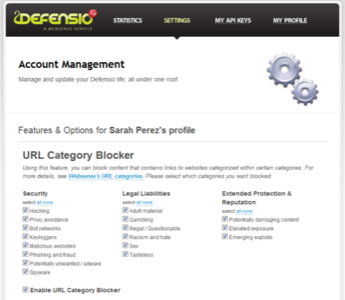Websense has just launched a new security suite for the Web, a product called Defensio 2.0. The main selling point of this software is its ability to protect users from malicious content posted to their Facebook profiles. Using a combination of technologies – which include a URL category blocker, a profanity filter, an executable file blocker, and a script blocker – users can configure what content can appear on their Facebook profiles or their public pages. In addition to offering Facebook security, Defensio offers blog protection, too, supporting a number of platforms including WordPress and Drupal.

A Facebook Application You Actually Need
Since Websense’s acquisition of Defensio a year ago, the company has been working on building this next generation product, which originally functioned as a simple spam-blocking tool used by blogs. As before, the Defensio software uses Websense’s ThreatSeeker Network, a technology that incorporates both automated computer analysis and human intelligence to protect against Web-based security threats in real-time.
Now Defensio is going beyond simply providing protection for various website and blogging platforms with their Facebook protection feature. This extra security operates by way of a Facebook application. When you sign up to try the new software, you give the product permission to access your profile in order to block malicious content as needed. Like any other Facebook app, installation is as simple as entering in your Facebook sign on credentials and hitting “Allow” on a few pop-up windows.
Configuring Your Protection Level
From the software’s Account Management page, you can check or uncheck the type of content you want to restrict from being posted to Facebook or your blog. URLs can be blocked by category like Security (hacking, phishing, spyware, etc.), Legal Liabilities (adult material, gambling, etc.), and more – or the feature can be switched off altogether. You can further customize the protection by entering in keywords to block, just as is typically done with blog comment spam protection systems. You can also enable or disable an executable file blocker and a script blocker which prevents scripts and links to executable files from being posted to your Facebook profile.

Doing Business on Facebook? Take Note
While this system will obviously appeal to any Facebook user concerned with security, the real market for this type of software is with the companies that use Facebook for professional purposes. These days, everyone from major corporations to mom-and-pop shops have set up their own Facebook pages for marketing purposes. Facebook is even being used in place of traditional websites in some instances. Take, for example, the recent commercial for the upcoming movie “When in Rome.” Instead of referring you to a traditional URL like wheninrome-movie.com, the commercial touts the Facebook page: facebook.com/wheninrome as the only place to view the trailer and movie information online.
Clearly, big businesses have a lot to lose if malicious software or objectionable content made its way onto their Facebook pages. Besides the bad press involved with being the source of a malicious attack of some sort, the companies would suffer something even worse (at least in their opinion) – no one would visit their page. That will make the Defensio suite a very appealing option for many companies, no matter what the expense.
Pricing
For now, those interested in demoing the software can do so for free. The company website currently lists monthly pricing starting at $5 a month for less than 100,000 comments (or wall posts). That should suffice for those wanting to run the software for personal use. However, the real money is in the business licensing. Those with 100,000-300,000 comments are charged $15 a month, and those with over 300,000 comments must purchase enterprise licenses. Here, the first three licenses are $50 a month with each additional license costing another $35. However, Websense admits that pricing levels may be adjusted after the beta period ends. While these rates are reasonable for the protection being offered, at this point Websense could practically charge anything they want since no other company offers this sort of automated protection for Facebook profiles.
If you’re interested in testing the program yourself, you can sign up for a free trial here.
















